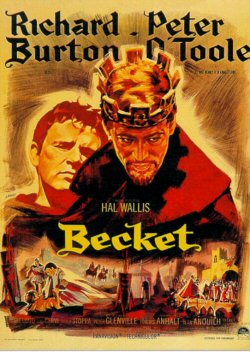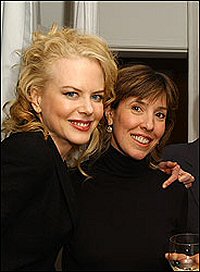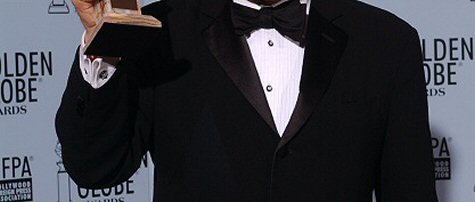Thighs and Whispers
Forget the implications in Lou Lumenick’s 11.18 New York Post story about the allegedly pronounced gay content in Oliver Stone’s Alexander (Warner Bros., 11.24).
The opening line reads, “Is Oliver Stone’s $150 million epic Alexander too gay for mainstream audiences?”
In other words, will hetero stalwarts stay away out of some kind of vaguely anticipated discomfort factor? Alarmed, perhaps, by a line of Alexander narration spoken by Anthony Hopkins’ Ptolemy character: “It was said that Alexander was never defeated except by Hephastion’s thighs”?

First, the movie’s scenes of same-sex intimacy and affection aren’t that pronounced. If anything, they’re timid. They’re presented in any case within the context of ancient Greek warrior culture, which allowed for degrees of sexual intimacy but wasn’t “gay” as we know the term.
< ?php include ('/home/hollyw9/public_html/wired'); ?>
One post-screening comment I heard from a critic friend after seeing the film last week was that Stone “didn’t have the guts to really show it.” Stone reportedly told a Playboy interviewer that “we may have had a few takes of them [Alexander and Hephaistion] kissing, but it wasn’t my intention” to show anything physically explicit.
Stone’s handling of suggested sexual intimacy between men in Alexander is no stronger than the way director Peter Glenville handled it 40 years ago in Becket .
I’m speaking of a first-act scene in which Peter O’Toole’s Henry II flops down on a bed inside a castle chamber room and then says to Richard Burton’s Becket, “I don’t want to be alone tonight, Thomas.” Burton nods and then picks up a candelabra and blows out the candles, one by one, as he quietly speechifies about his moral-ethical nature.

Alexander is said to be tracking very well, so it doesn’t appear as if anyone out there is particularly hesitant about seeing it.
But there is an element of spin, apparently, in what Alexander lead Colin Farrell said at the Alexander premiere last Tuesday in response to a question about gay content having been edited out. “”There was nothing really re-edited, man,” Lumenick quoted him as saying. “The film that you see is the film that was originally intended.”
A journalist friend told me a couple of days ago that an L.A.-based critic was shown a three hour and 40 minute cut of Alexander not long ago, and that the male-to-male intimacy in this version was more assertive that in the final version, which runs about 2 hours and 55 minutes.
Alexander was originally scheduled to open on 11.5. Lumenick writes that “there were widespread reports — since denied — that Warner Bros. postponed the release because of flak about the gay content at early screenings.”
“I don’t know how people are going to respond” to the film, WB production chief Jeff Robinov told an Entertainment Weekly reporter, “but I know Oliver didn’t run from who [Alexander] was.”
The Hand
This is going to seem like a slightly weird piece to some, but I noticed something fascinating this morning as I was reading Stuart Elliot’s piece in the New York Times about Pat Kingsley’s firing of Leslee Dart from the big-time p.r. agency PMK/HBH.
What got me is a telling detail in a photo of Dart posing with PMK/HBH client Nicole Kidman (taken by Michael Caulfield of Wire Image) than ran alongside the story.
People can say what they want to say and believe what they want to believe, but body language never lies.

I’m not saying Kidman doesn’t support and admire Dart as far as it goes, and I’m sure she’ll be offering encouragement as Dart starts up her own agency in the coming weeks and months, but on some deep-down level Kidman was feeling ambivalent about an aspect of their relationship, or perhaps about publicists in general, when this photo was snapped.
The proof is in the positioning of Kidman’s left hand, which is draped around Ms. Dart’s left shoulder. What the tips of her fingers are touching (or not touching, I mean to say) says it all.
Only Kidman’s left index finger is touching — pressed upon — Dart’s sweatered shoulder. The other three fingers are curled under and resting upon it. Kidman’s left thumb is not touching Dart’s shoulder either — it is stiffly positioned in a kind of noncomitted limbo state and surrounded by air.
You can call me an obsessive, but I don’t fool around when I hug my friends or put my arm around their shoulder. My thumb might be in the air — thumbs are often ambivalent in a social context — but all four finger tips are always touching or pressed into their flesh. That’s a standard homo sapien way of saying, “I mean it.”
Straight Story
A gifted young director with a style and sensibility all his own doesn’t exactly hit the jackpot with his first film (which he co-wrote), but anybody who knows or cares about movies loves it.
The next film is damn near perfect…a jewel. It still has the reputation of being his best ever.
But the one after that disappoints in some quarters, the primary complaint being that attention paid to the director’s exacting and very particular brushstrokes (as well as a certain deadpan quality to the performances) has gotten in the way, to some degree, of what the film is trying to say or be about.

Then the fourth film starts making the rounds, and it’s clear to many viewers this gifted, very precise guy has painted himself into a corner with an even greater focus on detail and brushstrokes and deadpan acting, and in so doing has pretty much outsmarted himself.
The particulars are fine but the essentials are missing. The film feels dry and perfunctory and won’t lift off the ground. It’s a mathematical equation without the magic.
Then you hear from a guy who’s known him for years and also knows many of the behind-the-scenes players who’ve known or worked with this filmmaker, and he says the problems in the film are reflections of a basic problem having to do with how the filmmaker has come to operate as well as see himself over the last two or three years.
The basic situation, he says, is that Mr. Gifted and Particular has gotten caught up in his own mythology, that he lives in a special self-created membrane, and has positioned himself so that no one with any kind of challenging input can get through on a creative/collaborative level.
“And now he’s basically come to the end of this thing that he’s been doing these last few years,” the inside guy says, “and now he needs to find something else.”
Big vs. Small
As long as we’re running blind descriptions of filmmakers, there’s the case of a greatly respected director who’s been working in the big-budget realm over the last few years and, one presumes, pocketing big paychecks for his trouble.
But directing expensive widescreen movies with historical backdrops and lavish production values is not what this guy is best at. His calling is more in the contemporary urban realm, which he’ll apparently be getting back into for his next film. Good.
His latest big movie, which cost well over $100 million to make, is a difficult sit and will most likely tank after the first weekend. In fact, it may tank so decisively (partly due to the uncompromising way in which the darker subject matter is handled) that he may never be handed the reins of a $100 million-plus movie again.

This, I submit, will be an excellent thing all around. History has shown that he’s a much better filmmaker when he’s working with medium or lower-scaled budgets. He’s better at imagining or creating his way around a problem instead of resorting to the usual big-budget solution, which is to throw money at it.
A metaphor of what this director may be facing (may be about to face) can be found in Ulu Grosbard’s True Confessions (’81).
Robert De Niro plays a wheeler-dealer Catholic priest caught up in all kinds of real estate deals and political chess-playing in late 1940s Los Angeles. But he loses his job due to his involvement in a sex scandal, and the church sends him to a small Palm Springs church… for the rest of his life, it turns out.
The scandal was triggered by an investigation by his brother (Robert Duvall), a homicide detective. But the gray-haired De Niro is not angry at the film’s conclusion. He thanks his brother for saving his life and helping him find God again. He was lost playing power games and dealing with big-money contributors in Los Angeles, he says. Being sent to the desert purified him and got him back on track.
The filmmaker I’m speaking of needs to do the same thing.
Prick Up Your Ears
The same guy who was first to identify last Friday’s dialogue clips — Eddie Smith of Bainbridge Island, Washington — did it again just minutes after I posted Wednesday’s clips two days ago. I don’t like repetition. Stop Eddie Smith!
The philosophical riff in Clip #1 is spoken by Gregory Peck’s Captain Ahab in John Huston’s Moby Dick (1956). Clip #2 and Clip #3 are from Ridley Scott’s Matchstick Men (2003) and a conversation between Nicolas Cage and Bruce Altman; and Clip #4 is Charles McGraw, William Conrad and Harrry Hayden in Robert Siodmak’s The Killers (1946).
Among today’s clips, Clip #1 is from a very familiar classic from the early ’50s; Clip #2 features the voice of an actor with one of the most irritating regional accents in the history of motion pictures; and Clip #3 and Clip #4 are from the same film and feature the same actors.
Send in your answers quickly and I’ll post the winner next Wednesday, as long as he’s not Eddie Smith.
New Design
Hollywood Elsewhere is being re-designed to some degree. I had hoped that it would be up today (i.e., Friday, 11.19), but you know how these things go. I’m told the newbie will be up and viewable by sometime tomorrow.
The new Elsewhere is not going to look radically different. Mainly a slight upgrading in terms of this and that design element. The home page is being harmonized with the look of the other column pages. When you click from one page to the other it will all seem fluid and smoother. Gray gutters are being added, some new lettering on the navigation bar…stuff like that.
The guy who’s been doing all the work is Christopher Risdon. He’s from Georgia and has a Masters in Graphic Design, and I think he’s done a really excellent job so far. Any comments or criticisms anyone may have will be welcome. Sometimes it helps to hear from people who haven’t been involved in the step by step.
As I Was Walking…
…up Sunset Blvd. the other night in front of Tower Records, across from Book Soup, I happened to look up and there was this brand-new billboard. Million Dollar Baby is finally starting to be screened, and with any luck I’ll catch up with it early next week.
After that happens there will be just one more possible award-level contender to go — Jim Brooks’ Spanglish — but I’m told no one will see it until sometime in early December. I was also told I was wrong about the final music being on the version that was shown early last week in Orange. The final scoring session hasn’t happened yet.













